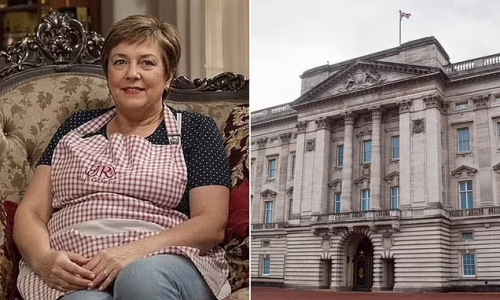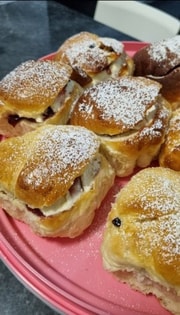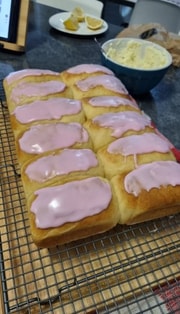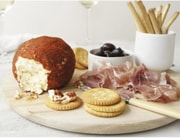‘We were strictly trained to avoid it’: Former royal maid exposes banned kitchen tool
By
Maan
- Replies 0
Keeping one of the world’s most famous households spotless takes more than just elbow grease—it demands precision, special rules, and a few surprising secrets.
One former royal maid has lifted the lid on a surprising ban within Buckingham Palace’s kitchens, offering a rare glimpse into the hidden world of royal cleaning standards.
What she revealed might just change the way you clean your own home.
A former royal maid has revealed the one household item she was forbidden from using inside Buckingham Palace’s grand kitchens.
Anne Simmons, 57, from Berkshire, spent more than a decade working as a cleaner across the palace’s sprawling 775 rooms.
During her time there, she picked up a range of specialised tips to maintain the royal residence to the highest standards—especially in the kitchen, where there was zero tolerance for grime.
Speaking to Plumbworld, Anne shared that steel wool cleaning pads were strictly off-limits to protect the palace’s pristine surfaces.
'We were strictly trained to avoid steel wool and scouring pads at all costs,' she explained.
'While they can scrub grime away, they’re too harsh for kitchen surfaces, especially in royal estates where quality materials like marble and granite are used.'
While steel wool dishcloths have become a go-to in many households for their ability to remove stubborn dirt, Buckingham Palace officials were not willing to risk any damage to their high-end finishes.
'High-end kitchen surfaces such as granite, marble, and stainless steel are prone to scratching,' Anne added.
'Even small scratches can affect the surface’s appearance and make it harder to clean. The royal kitchens couldn’t afford to damage their materials.'
Instead, the royal staff were trained to use far gentler options for their daily cleaning routines.
Anne said they relied on 'microfiber cloths', calling them 'soft and non-abrasive'.
'Steel wool and scouring pads might make your kitchen look clean immediately, but over time they can dull the finish,' she said.
'Once surfaces are scratched, they’re harder to maintain, and bacteria can get trapped in those grooves.'
'A beautiful kitchen doesn’t require harsh tools, just the right cleaning habits. Use gentle products, and your surfaces will stay pristine.'
Beyond the ban on abrasive tools, Anne also detailed one clever hack that helped keep the palace’s kitchen surfaces spotless.
She revealed that every evening, the royal maids would wipe down the kitchen with a homemade cleaner crafted from everyday ingredients.
'Every evening, we’d spray down all the kitchen surfaces using a homemade mix of vinegar, lemon juice, and warm water,' she said.
'It cuts through grease effortlessly and leaves everything looking polished without any sticky residue.'
Anne explained that using 'pH-balanced cleaners like vinegar and mild dish soap' was the secret behind the palace’s immaculate shine.
Her advice serves as a reminder that the most effective cleaning methods can often be the simplest—no steel wool or harsh scrubbing required.
In a previous story, another cleaning expert revealed a surprising household item that was banned inside Buckingham Palace kitchens.
The former royal maid shared insider tips on how the palace kept its luxurious surfaces looking flawless.
If you missed it, make sure to check it out for even more professional cleaning secrets!

Would you swap your regular cleaning routine for these royal-approved methods? Let us know your thoughts in the comments.
One former royal maid has lifted the lid on a surprising ban within Buckingham Palace’s kitchens, offering a rare glimpse into the hidden world of royal cleaning standards.
What she revealed might just change the way you clean your own home.
A former royal maid has revealed the one household item she was forbidden from using inside Buckingham Palace’s grand kitchens.
Anne Simmons, 57, from Berkshire, spent more than a decade working as a cleaner across the palace’s sprawling 775 rooms.
During her time there, she picked up a range of specialised tips to maintain the royal residence to the highest standards—especially in the kitchen, where there was zero tolerance for grime.
Speaking to Plumbworld, Anne shared that steel wool cleaning pads were strictly off-limits to protect the palace’s pristine surfaces.
'We were strictly trained to avoid steel wool and scouring pads at all costs,' she explained.
'While they can scrub grime away, they’re too harsh for kitchen surfaces, especially in royal estates where quality materials like marble and granite are used.'
While steel wool dishcloths have become a go-to in many households for their ability to remove stubborn dirt, Buckingham Palace officials were not willing to risk any damage to their high-end finishes.
'High-end kitchen surfaces such as granite, marble, and stainless steel are prone to scratching,' Anne added.
'Even small scratches can affect the surface’s appearance and make it harder to clean. The royal kitchens couldn’t afford to damage their materials.'
Instead, the royal staff were trained to use far gentler options for their daily cleaning routines.
Anne said they relied on 'microfiber cloths', calling them 'soft and non-abrasive'.
'Steel wool and scouring pads might make your kitchen look clean immediately, but over time they can dull the finish,' she said.
'Once surfaces are scratched, they’re harder to maintain, and bacteria can get trapped in those grooves.'
'A beautiful kitchen doesn’t require harsh tools, just the right cleaning habits. Use gentle products, and your surfaces will stay pristine.'
Beyond the ban on abrasive tools, Anne also detailed one clever hack that helped keep the palace’s kitchen surfaces spotless.
She revealed that every evening, the royal maids would wipe down the kitchen with a homemade cleaner crafted from everyday ingredients.
'Every evening, we’d spray down all the kitchen surfaces using a homemade mix of vinegar, lemon juice, and warm water,' she said.
'It cuts through grease effortlessly and leaves everything looking polished without any sticky residue.'
Anne explained that using 'pH-balanced cleaners like vinegar and mild dish soap' was the secret behind the palace’s immaculate shine.
Her advice serves as a reminder that the most effective cleaning methods can often be the simplest—no steel wool or harsh scrubbing required.
In a previous story, another cleaning expert revealed a surprising household item that was banned inside Buckingham Palace kitchens.
The former royal maid shared insider tips on how the palace kept its luxurious surfaces looking flawless.
If you missed it, make sure to check it out for even more professional cleaning secrets!
Key Takeaways
- A former Buckingham Palace maid revealed that steel wool pads were banned to protect marble and granite surfaces.
- Staff were trained to use only soft, non-abrasive tools like microfiber cloths for cleaning.
- Scratches from harsh cleaners could ruin surfaces and trap bacteria, making them harder to maintain.
- The maids used a homemade cleaner of vinegar, lemon juice, and warm water to keep the kitchens spotless.
Would you swap your regular cleaning routine for these royal-approved methods? Let us know your thoughts in the comments.








